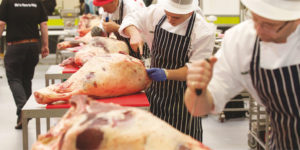Food Safety Inspector careers guide & job description
Without food safety we'd all be in BIG trouble. You make sure food is safe to eat. Thank you!
Similar jobs: Food quality inspector, food safety officer
This is a job you can get started in as a school leaver with GCSEs! With big tech, Industry 4.0 and the Internet of Things on the rise, many factories are getting increasingly Willy Wonka with marvellous technology being used to prepare the food we eat. But what is that food really like? Is it safe?
In Charlie and the Chocolate Factory, Violet Beauregarde chewed gum before food inspectors had said it was ready for the public and inflated into a giant blueberry.
As a food manufacturing inspector, it’s your job to make sure people never inflate into a giant blueberry. You check that any companies producing food meet hygiene and safety standards, and that the food is safe to eat.
How much money can you earn as a Food Safety Inspector?
These LMI Job Trends give you a sneak peek of how much you could earn starting out for this career, and how much your salary could grow with experience.
Average salary for Food Safety jobs
Recent labour market information says you can earn on average between £15,000 and £30,000 a year as a food manufacturing inspector in the UK.
Your starting salary can vary because of factors like level of experience, training, or location. Your salary will increase over time as you build skills, knowledge and experience.
Skills you need to become a Food Safety Inspector
Useful skills to put in your CV:
- Self-belief skills – it takes determination to get hold of salon managers and owners as they are always so busy. You will also have sales targets to reach. But you have confidence in yourself and your company’s products and you never give up!
- Great communication skills – sometimes you’ll make discoveries that people don’t want to hear about where their food production standards need improving. But you need to stay strong and state your case.
- Digital skills will help you study samples or facts and data. You’ll work with equipment and computers to log, test and present your findings.
- A great eye for detail – from testing samples to checking labels and packaging, you’ll care about the little things.
How Do You Get These Skills?
Vocational qualifications and work experience will help you build these skills over time.
What Qualifications & Training Do You Need For Food Safety Careers?
School, college and training
You’ll usually need at least five GCSEs or their equivalents at grades 9-4 (A* to C) including English, science and maths to do this job.
GCSEs are enough to get you started in a role checking food as a QA inspector (short for Quality Assurance). From there, you can learn on the job and explore part-time further education as you work to build your food science and food safety qualifications and knowledge.
What employers might ask for:
- A minimum of 5 GCSEs or the equivalent
- Food production experience
- Understanding of food laws
- Food hygiene certificates
Vocational Qualifications
After GCSEs, you’ll find it useful to do an A-level, BTECs, T-Levels or the equivalent and then apply for a foundation degree, degree or HND in a subject like food science, food studies or food technology. This food science background will impress employers and help you get a food safety inspection job at a higher salary with more responsibility.
T-Levels
T-Levels are a choice for learners after GCSEs alongside apprenticeships and A-levels. You can do a T-Level in Engineering, Manufacturing, Processing and Control. This qualification comes with an industry placement and can help you get a manufacturing career.
BTECs
As an alternative to A-Levels, you can do BTECs from the age of 16. The BTEC in Food Safety in Catering gives you the specialist knowledge and skills to progress into, for example, an apprenticeship or employment.You’ll learn a lot including basic food safety practices in the world of catering, and how to improve the safety of a catering service as a whole.
Apprenticeships
An apprenticeship is a scheme where you train while earning a starting salary.
With an apprenticeship (or advanced apprenticeship) you’ll have a paid job with an employer that includes structured training and learning. This training leads to an official qualification that’s recognised by employers as an industry standard.
The Level 4 Hygiene Specialist apprenticeship is great if you want to specialise in keeping things clean and safe in food production, sterile environment and laboratories.
You can also read up about the Safety, Health and Environment Technician apprenticeship. It gives school leavers the opportunity to get started in a health and safety career.
You can seek out food safety apprenticeships with organisations like Find an Apprenticeship.
Look for Environmental Health apprenticeships – they’ll help you become a practical and experienced all-rounder who knows all about health and safety in the world of manufacturing, and this apprenticeship will open a lot of career doors.
University degrees and graduates
As a Food Safety Inspector, you come under the umbreall of Environmental Health Practitioner (EHP). A lot of EHPs start their journey with an Environmental Health degree. It makes you a powerful all-rounder with lots of career options to choose from in the world of environmental health – including food safety.
UCAS has more information on degree courses and entry requirements.
Green Careers and Animal / Environmental Careers FAQs
Is there something you’d like to know about animal and environmental careers? Maybe we can help!
- DID YOU KNOW? You can get into these careers with T Levels!
- 5 tips on getting environmental jobs
- Green careers with the Environment Agency
- What are the UK’s best-paid environmental jobs?
- 5 reasons to explore ABP food industry careers
- You can get health & safety apprenticeships that help you study for a FREE degree!
- Nature volunteering can help your confidence and CV
Career Progression
If you want to work towards a higher salary and quicker opportunities for responsibility and promotion, because you’ve proved you know what it takes, you can aim to get qualifications in food technology, science or chemistry.
You may want to build up qualified environmental health officer experience. With time and experience you could become a food safety manager and lead a team of inspectors. You could also move into the world of food science or environmental health once you’ve done more training.
What Work Experience Do You Need For Food Safety Jobs?
Work Experience Tips
It can help you decide if this is the right career for you if you have previously done work experience in a food production environment.
- Look for part-time, full-time or seasonal work in a food production establishment – it could be a restaurant or a food factory. This will give you CV experience and a good grounding in health and safety regulations involved in the production of food.
- Snap up any opportunity to get work experience as part of a course in food science or a similar subject.
Volunteering Tips
There are lots of volunteering opportunities in the world of food production, from helping out with school charity bake sales to volunteering with food banks.
Try to think about what food safety might meaning in each environment. Do people creating and handling the food need to think about customers who might have dietary requirements and food allergies, and need to know exactly what’s in the food? Does some of the food need storing (e.g. meat or dairy) so it doesn’t become unsafe to eat after being left out in the hot sun all day?
Volunteering tipsWhat Does a Food Safety Inspector Do?
Where could you work and what could you do as a food safety inspector?
Knowing a little more about food safety will help you show employers that you understand what this job is about. It can also help you decide if it’s right for you.
Your main responsibility is to make sure that any food processed in factories, sold in shops or served to customers in restaurants is genuinely safe for people to eat.
Example daily job responsibilities:
- Inspecting working conditions (be warned – this could include slaughterhouses)
- Doing quality control checks
- Testing food samples – this could include ingredients or final products
- Analysing results and presenting your findings
- Training up staff who make the food so they understand all about food hygiene and safety
- Checking labels and packaging for hygiene and accuracy
- Giving advice to companies on how they can improve their food safety, and giving them warning notices when they’re not up to scratch.
How To Find Food Manufacturing Safety Jobs: Next Steps
To find jobs for young people in this role, search on jobs boards for early career roles and opportunities with these words in the title:
- Food safety inspector
- Food hygiene inspector
- QA Inspector (food)
- Food quality assurance assistant
- Food safety environmental health officer
- Food quality control inspector
These websites might be able to help you find food safety experience or a role that’s a good fit for you:
You can also take a look at our database of local opportunities to see if there are any relevant jobs, work placements, or careers events and workshops to help you get started.
Get Into Manufacturing & Engineering Careers With Youth-Friendly Employers
These employers and organisations are here to help. They care about your potential and desire to learn, not just your qualifications and experience. They may be able to offer traineeships, apprenticeships, graduate schemes, first jobs, careers advice, wellbeing support and much more.
Engineering Career Tips & Opportunities

Field Engineering Apprenticeship with Coca-Cola Europacific Partners – Reading, High Wycombe & Slough #CreateYourFuture

Field Engineering Apprenticeship with Coca-Cola Europacific Partners – Romford, Ilford & Chingford #CreateYourFuture

Field Engineering Apprenticeship with Coca-Cola Europacific Partners – Taunton, Honiton & Yeovil #CreateYourFuture
Engineering & Manufacturing Career Guides
View job descriptions with average UK salary, useful qualifications and a variety of routes into this career.
Get Into Land, Animal & Environment Careers With Youth-Friendly Employers
These employers and organisations are here to help. They care about your potential and desire to learn, not just your qualifications and experience. They may be able to offer traineeships, apprenticeships, graduate schemes, first jobs, careers advice, wellbeing support and much more.
Agriculture, Animal & Environment Career Tips & Opportunities
Have You Thought About These Agriculture, Animal & Environment Careers?
View job descriptions with average UK salary, useful qualifications and a wide range of routes into each career.
-
Archaeologist Careers
-
Bin Collector / Refuse Collector Jobs & Careers
-
ABP Apprenticeships, Graduate Schemes and Early Careers
-
Graduate Schemes with ABP
-
Apprenticeships with Youth Friendly Employer ABP
-
QESH (Quality, Environment, Safety & Health) Degree Apprenticeship with Coca-Cola Europacific Partners
See All Our Youth-Friendly Employers






































































YES! I Want More Free Careers Help...
So what are you waiting for? Grab your future.



















































